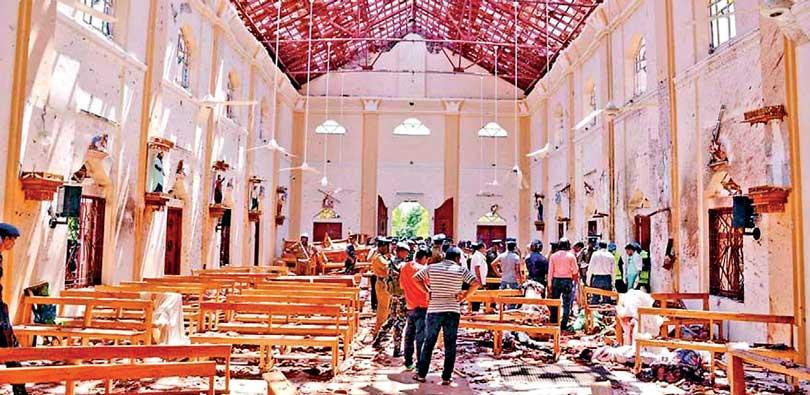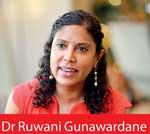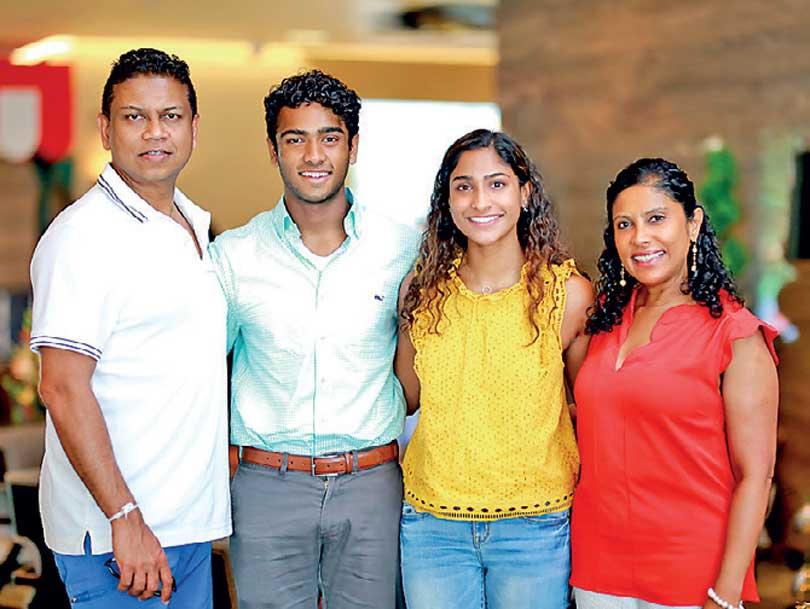14 Jan 2020 - {{hitsCtrl.values.hits}}

 On Easter Sunday morning, many in Sri Lanka woke up to the news of the terror that was unleashed within minutes at churches and hotels but for the Gunawardane family based in Maryland, USA, it was just after dinner when they received the news of the Easter Sunday attacks. Dr Ruwani and Dr Vajira slowly broke the news to their twins, Sonali and Sohan Gunawardane, both aged 17 and students at McDonough High School. The family was shaken.
On Easter Sunday morning, many in Sri Lanka woke up to the news of the terror that was unleashed within minutes at churches and hotels but for the Gunawardane family based in Maryland, USA, it was just after dinner when they received the news of the Easter Sunday attacks. Dr Ruwani and Dr Vajira slowly broke the news to their twins, Sonali and Sohan Gunawardane, both aged 17 and students at McDonough High School. The family was shaken.
When Notre Dame was burning, people cared but when Sri Lankans were dying, no one did.
The oldest, Shivi Gunwardane was on her college campus when she heard of the incident. A premed undergraduate at the University of Rochester, New York, she was a good six-hour drive away from her parents and siblings. Unable to be with her family at this time, Shivi sought out her friends and was surprised that they didn’t know about the attacks.

I started complaining to my friends about the unfair coverage of western media vs what happens on the other side of the world
“It seemed like nobody knew what was happening which is funny because just a week before the Notre Dame burned down with no casualties and the world grieved for the building. It bothered me that the international media did not cover the attacks in Sri Lanka and that no one knew or seemed to care. I started complaining to my friends about the unfair coverage of western media vs what happens on the other side of the world.”
It was then Shivi came up with the idea to make bracelets and raise money for the Sri Lankans affected by the attacks.
Shivi quickly contacted Sonali and let her know about what she was going to do. “I heard what Shivi wanted to do and I said I would do it too. Whilst Shivi planned to sell them among her college mates, I decided to make and sell it among my school friends,” Sonali stated.
Thus, the three siblings started making bracelets. “Even we were disappointed at how the Easter Sunday attacks didn’t get as much concern and coverage as the Notre Dame did. A building burnt down and people all over the world contributed in millions but here more than 250 people were killed, scores injured, families torn apart and many weren’t aware. We wanted to help out and raise awareness because it was our home country,” remarked Sohan.
Shivi had to make the bracelets by herself. As a pre-med student, she had a challenging course at university but with the help of her friends, she managed to make bracelets within a short period of time. At Maryland, Sonali was teaching Sohan how to braid the strings and make the bracelets. Making the bracelets strengthened the bond between the twins. “It was during exam week when we were doing this and we were so stressed but making these bracelets made us laugh and feel better. Sohan used to get stuck with the braiding and make a mistake, then he would panic and come to me. I had a lot of fun teaching him how to braid,” recalled Sonali.
“It was fun to learn to braid though it was hard at the beginning. As soon as I got a hang of it, I could quickly make them. Then, it became like an assembly process where I would braid the bracelets and Sonali would stitch the teardrop bead on,” Sohan added. Shivi chose the teardrop bead on Amazon because the teardrop resembled the shape of Sri Lanka. Sonali too ordered the beads off Amazon to sew them on the bracelets they were making.
“People were generous,”
At McDonough High School, the twins conducted a presentation regarding the attacks at the assembly and wore the bracelets to school, soon requests for the bracelets and donations started flooding in. Sonali, the Vice President of the Student Government, told the Principal what they were doing and they were granted permission to sell those bracelets.
“We sold the bracelets for $5 each and even teachers bought them. We posted on social media and unknown people were sending in donations. As people became aware, they became concerned and generous. We made over a 100 bracelets and collected around $1400,” informed Sohan.

It was fun to learn to braid though it was hard at the beginning. As soon as I got a hang of it, I could quickly make them. Then, it became like an assembly process where I would braid the bracelets and Sonali would stitch the teardrop bead on

Children should be encouraged to help anyone they can, in any way they can. A small act of kindness can cause a world of difference to someone
Dr Ruwani and Dr Vajira recalled how some people who after just seeing Sonali’s social media posts donated money for the cause. “They didn’t even want a bracelet, they just donated. People were very generous,” stated Dr Vajira. The parents informed that they had only helped to find donees. “The children were very independent, they didn’t want us helping them in any other way except in finding a donee,” revealed Dr Vajira.
Finding a donee

Why we chose them as donees are because losing a parent or guardian can be challenging and especially when it happens suddenly. We wanted to be of some help to them in this difficult time
Dr Vajira reached out to all his contacts in Sri Lanka including his batchmates from Ragama Teaching Hospital. He said that the children were very specific that they didn’t want to donate to any organization but to donate it to a victim or if they were unable to find a donee, to the Cardinal. It took months until they finally found two donees through Dr Dimuth Jayasekera, who was treating the victims at Negombo. The two donees were two girls aged 16 and 12. The 16-year-old had lost her mother in the attacks and the 12-year-old had lost her guardians who were her uncle and aunt.
“Why we chose them as donees are because losing a parent or guardian can be challenging and especially when it happens suddenly. We wanted to be of some help to them in this difficult time,” shared Sonali. They donated the money on their visit to Sri Lanka, last week.
Parents’ sentiments
The children state that they’ve learnt about the importance and joy of giving and sharing from their parents as the doctors have also been involved in such acts; they donated medical supplies, blankets and other necessities during the Tsunami period in Sri Lanka.
“It is nice to see them being generous and empathizing with people,” shared Dr Ruwani. She stated that they were worried that the children would stay up all night braiding bracelets and about how they would manage with exams. “I am happy they managed everything well, themselves,” she stated.
“When children do something like this, as parents we should encourage it. That is why we encouraged this. We have a comfortable life but we do show our children that there is a world beyond our comfort; a world where people live in poverty, suffer injustice and are unheard. Them knowing this and wanting to share whatever they have to make someone else’s life better in some way, gives me happiness,” said Dr Vajira.

The children were very independent, they didn’t want us helping them in any other way except in finding a donee
Both the doctors stated that every parent should encourage giving and it should start from all ages and levels. “Children should be encouraged to help anyone they can, in any way they can. A small act of kindness can cause a world of difference to someone,” said Dr Ruwani.

Pix by Damith Wickaramasinghe
08 Jan 2025 8 minute ago
08 Jan 2025 53 minute ago
08 Jan 2025 3 hours ago
08 Jan 2025 4 hours ago